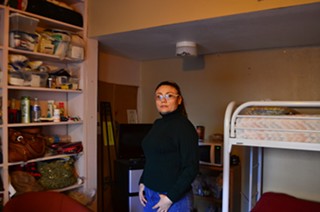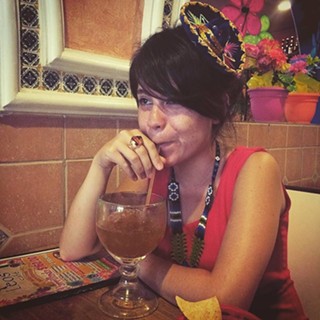For Rosa Robles Loreto, January was the roughest month out of the now six she's been living in sanctuary at Tucson's Southside Presbyterian Church.
The mental and emotional strains of not being home with her husband and two boys, and witnessing her case with the Department of Homeland Security remain static—it's catching up to her.
Not that it wasn't a burden before, but living in the church for half a year makes her very nervous.
"I pray to God ... I say, 'If it is still not my time to leave here, please give me strength so that I can transmit that to my children and my husband,'" she says on this rainy and gray Saturday afternoon. Her husband, Gerardo, and two sons, Gerardo Jr., 11, and José Emiliano, 8, were out running errands for mom. Robles Loreto was anxious for them to return.
Lately, that uneasiness is constant.
"My God, will it be another six months?" she says.
When Robles Loreto walked through Southside's wooden-carved doors on Aug. 7, 2014, escaping deportation, she thought she'd be staying for maybe a little over a week. She even requested 10 days off at the homes she worked for years as a housekeeper.
It's February, and DHS and Immigration and Customs Enforcement haven't lifted a finger to kill her deportation order.
The other two people to seek sanctuary in Tucson—Daniel Neyoy Ruiz was the first case at Southside in May 13, 2014, and Francisco Perez Cordova took sanctuary at St. Francis United Methodist Church on Sept. 25, 2014—have been out for months. Neyoy Ruiz left Southside in June 2014, after DHS granted him a one-year stay. Perez Cordova went home in December 2014, following a little more than 90 days at St. Francis thanks to President Barack Obama's late-November immigration action, which granted parents of U.S. citizen and resident children deportation relief and a three-year work permit.
Both of them qualify for that program. Robles Loreto doesn't.
Her two kids were born in Hermosillo, Sonora. She and her husband couldn't afford hospital fees on this side of the border, and didn't want to use government assistance to pay for the medical care.
Robles Loreto's case began like so many others in Tucson—with a traffic stop. It was 2011, post-SB 1070, cops peeked into her immigration status in the country, which led to two months in a detention center in Eloy. In December 2011, she sent a letter and several other documents, including income tax forms and letters of recommendation, pleading DHS to close her case. She heard nothing back.
Twelve days after she entered sanctuary six months ago, Immigration and Customs Enforcement said her deportation order wasn't a priority, but it was alive. They could still take her away from her family, from her life on U.S. soil; the country Robles Loreto, a Mexico native, has called home since 1999.
These days, in her words, have been hell. Nothing distracts her—not TV, or reading, or the English lessons she listens to sometimes. Her sleeping pills lost their effect a long time ago. She lays on her bunk bed and sees 9 p.m. turn into 3 a.m., wide awake. Her mind twisting and turning.
There are mornings when she doesn't leave her room anymore. "To see that it's 11 a.m. or noon already and that everything is still the same, I think 'There goes another day, another day.' I used to not think like that. Now I do," she says in Spanish.
The first few months she didn't look too far into the future or let any negative thoughts conquer her spirit. Today, fear, melancholy and uncertainty are present in her eyes, her movements and her tone of voice.
Her biggest concern is knowing that her absence has begun to deeply affect her family. Her husband is exhausted and her boys' discontent reflects at school. She's getting calls now, teachers telling her they are not doing well in some classes.
Robles Loreto and her husband don't discuss anything when their kids are around anymore. The boys get their hopes up and those are then crushed when another week goes by and mom still can't come home.
"It is hard for me, to see my sons, they ask me, 'Mom, have they said anything to you? Mom, have they called you?' It wasn't like that before. It makes it harder for me," she says.
Robles Loreto tries to be as present in her sons' lives as she can. She calls them early in the morning to wake them up for school, and is on the phone with them until they get on the bus. They're in her mind all day until she can talk to them again.
It is puzzling to the community, to Robles Loreto's attorney Margo Cowan and to her friends at Southside why she hasn't seen the end of this road.
"I didn't think she would have to enter sanctuary. I thought us telling ICE, 'We have another person entering into sanctuary, having the experience with Daniel (Neyoy Ruiz) and winning that case in 28 days, I thought they would say, 'OK fine. We will close the case," says Southside Presbyterian Church's the Rev. Alison Harrington. "Then I thought, well maybe it will take a week ... and here we are six months later, which is unfortunate."
Harrington says it is up to those around her to also put up a fight in Robles Loreto's name.
"For people who say, 'It's been six months, it isn't working.' Well, it is working, because it is six months that she is not in Mexico saving money to cross a very dangerous desert," Harrington says.
Over the weekend, Cowan visited Robles Loreto with some bad news: Cowan received an email from Jon Gurule, ICE Detention and Removal Operations deputy field office director in Arizona, saying he is not closing Robles Loreto's case. But, Cowan, Harrington and supporters are willing to take the fight closer to the White House—to Secretary of Homeland Security Jeh Johnson and even to Obama himself.
"We won't lose Rosa, Rosa will win," Cowan says. "And it is just a matter of time, and I would like it to be a matter of less time rather than more time, but we will not lose Rosa."
This month, Robles Loreto's children are signing up for Deferred Action for Childhood Arrivals, Obama's 2012 executive action that granted deportation relief, a work permit and Social Security cards to hundreds of thousands of young immigrants who came to the U.S. before the age of 16. In November, Obama expanded the renewable program to three years rather than two, and got rid of age restrictions to apply, among a couple other tweaks.
Cowan and Harrington say it doesn't make sense for Obama to extend who qualifies for DACA, but offer no protection to DACA parents. However, the two speculate that after Robles Loreto's children apply for the program—U.S. Citizenship and Immigration Services starts accepting applications on Feb. 18—her case might finally come to an end or get very close to a resolution.
As for Robles Loreto, she constantly reminds herself the purpose for being in sanctuary to get by. She also finds peace through prayers and the countless daily visits from people of all corners of Tucson.
"I came here with the mentality to fight, but it has been rough for me," she says. "I wish citizens of this country will have the opportunity to understand us a little bit. We know we are undocumented, but we are still human. It pains us, the fear of being on the streets and wondering if we will come home. We also work, we also live like them, like citizens of this country. Every day, I pray for my case to close. I just want it to close."











